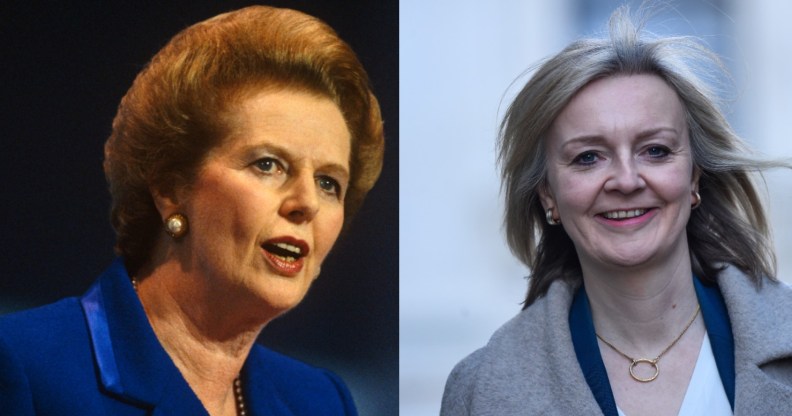Liz Truss’ attack on transgender youth slammed as ‘successor’ to Margaret Thatcher’s homophobic Section 28

Former Conservative prime minister Margaret Thatcher in 1990 and current Conservative minister for women and equalities Liz Truss. (In Pictures Ltd./Corbis and Peter Summers va Getty)
Tory equalities minister Liz Truss’ comments about trans youth are a “new edition” of Margaret Thatcher’s homophobic Section 28, according to the Labour Campaign for Trans Rights.
On April 22, Truss set out her plans for the UK’s Gender Recognition Act (GRA) at a virtual meeting of the women and equalities select committee.
She said that the government response to 2018’s comprehensive public consultation on reforming the GRA would follow three “very important principles”, one of which is “making sure that the under 18s are protected from decisions that they could make, that are irreversible in the future”.
“I believe strongly that adults should have the freedom to lead their lives as they see fit, but I think it’s very important that while people are still developing their decision-making capabilities that we protect them from making those irreversible decisions,” Truss added.
Truss’ statement sparked immediate alarm among parents of transgender youth and concern from LGBT+ organisations, and has been interpreted as a direct threat to the currently available healthcare for trans youth in the UK.
Writing for The Metro, the chair of the Labour Campaign for Trans Rights, Torr Robinson, said that Liz Truss’ comments are a “disaster for the trans community” and would be “a successor” to the homophobic Section 28.
Section 28, brought in by Thatcher’s government in 1988 and not repealed until 2003, banned the “promotion of homosexuality” in UK schools and barred local authorities from promoting “the acceptability of homosexuality as a pretended family relationship”.
Robinson said: “Truss announced that the government would seek to restrict transgender young people’s right to access transition-related healthcare, in order to ‘protect’ them from ‘decisions they could make’.
“In Britain, people under 18 have the human right to consent to medical procedures. A restrictive policy applying only to trans people would be an exceptional breach of this right.
“It would be a successor to the old Conservative policy of Section 28 – a law banning schools and teachers from discussing homosexuality, which supposedly aimed to protect youth from bad ‘choices’.
“The effects of this law were devastating to a generation of LGBT+ young people, and this new edition would be just as damaging for young trans people today.
“After all, none of us ‘choose’ to be LGBT+.”
The Labour Campaign for Trans Rights is a grassroots campaign that launched in February 2020 to challenge transphobic rhetoric within the Labour party.
It published a set of pledges in support of trans rights that it urged Labour MPs to sign.
Most of the Labour leadership contenders, including Lisa Nandy and Rebecca Long-Bailey, immediately signed the pledges and restated their staunch support for trans rights.
However, Labour’s new leader Keir Starmer has refused to sign the pledges.

